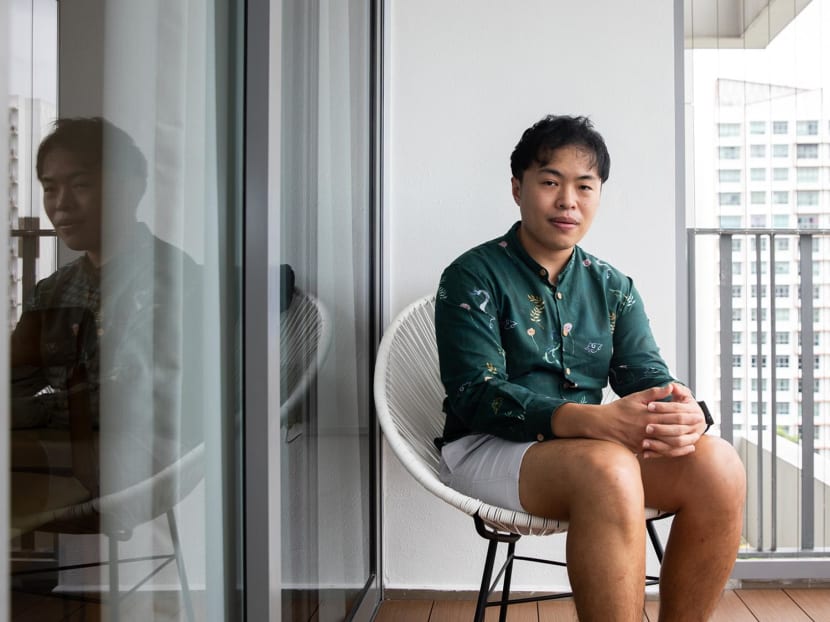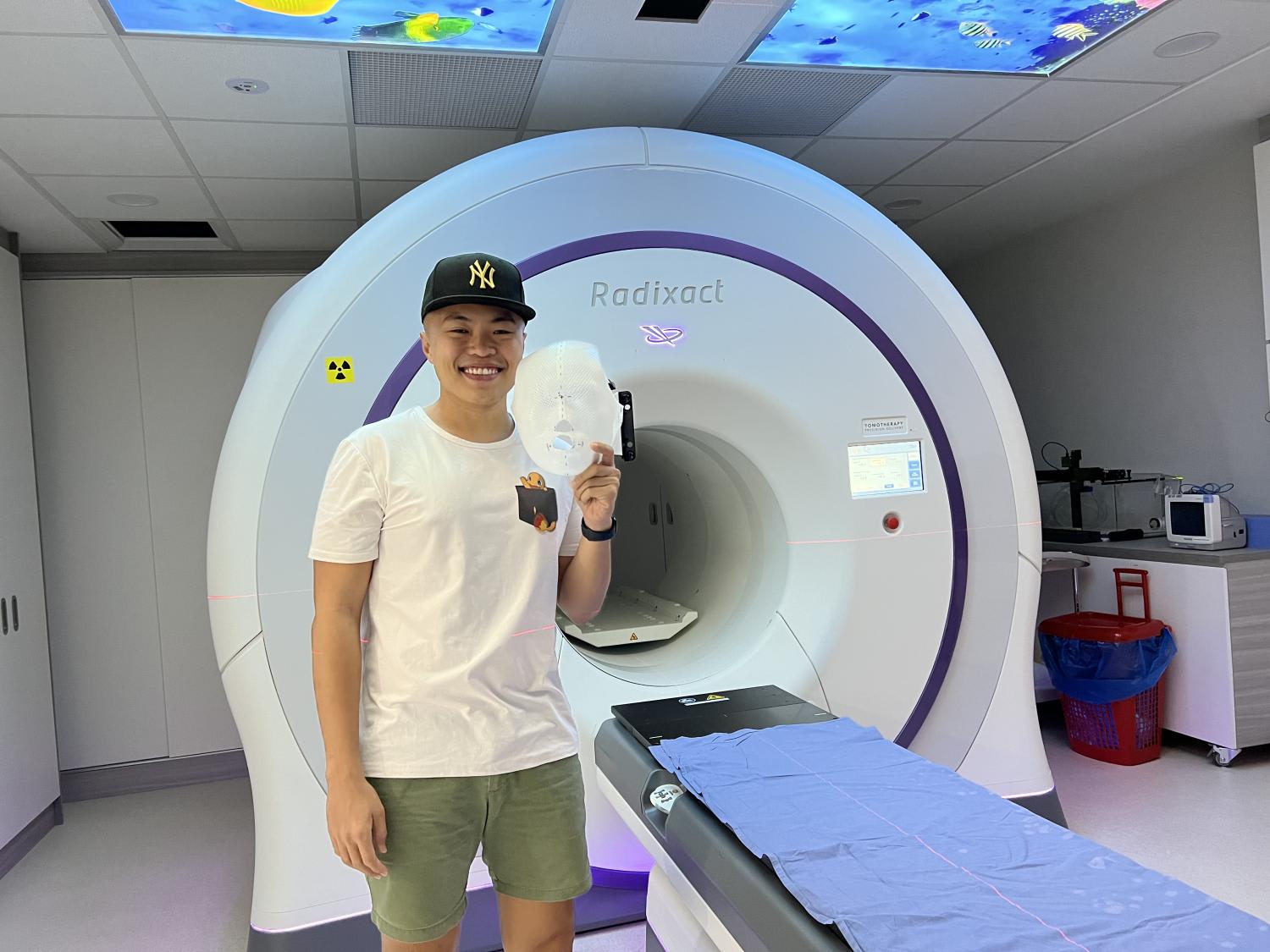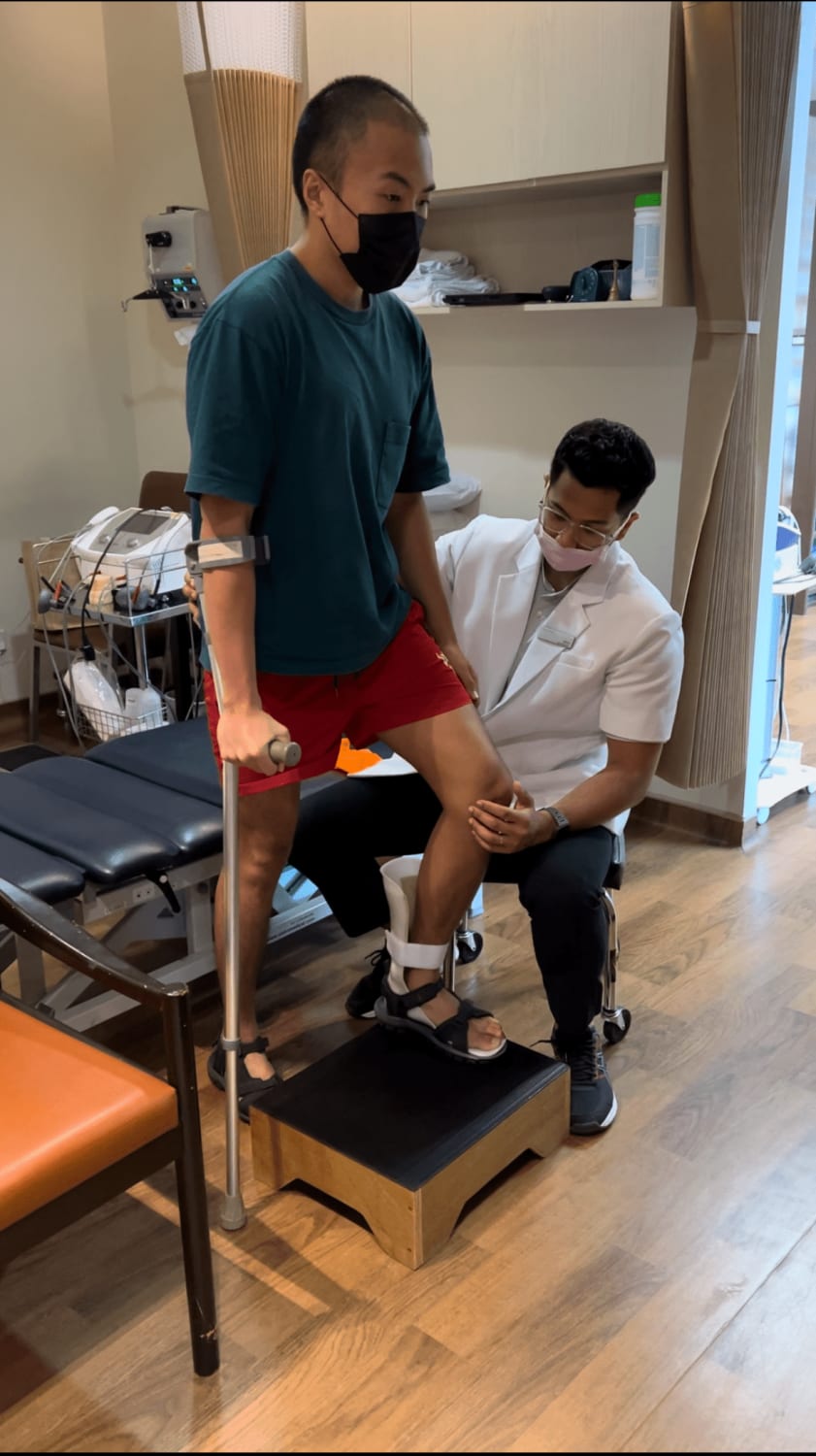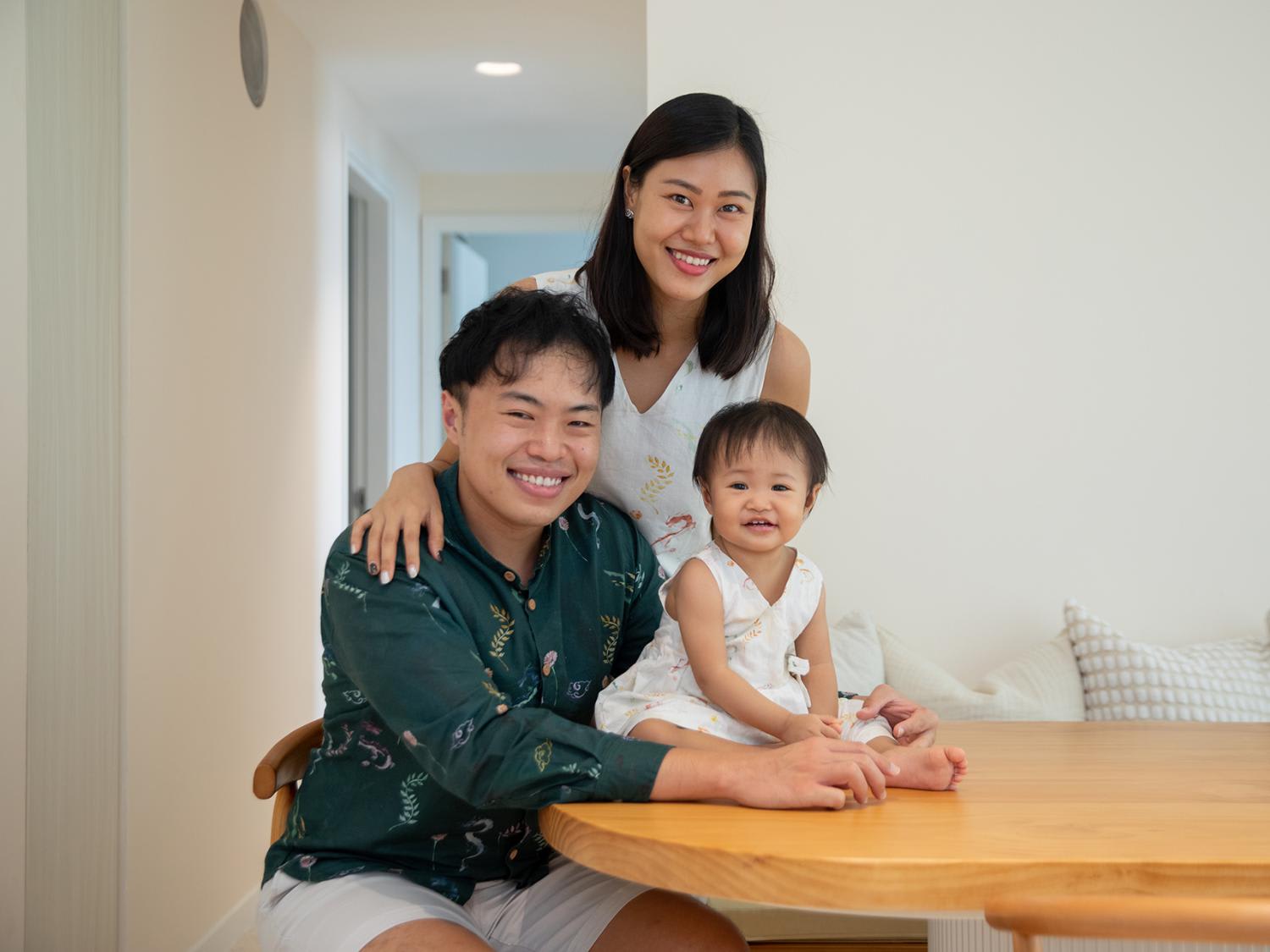Gen Y Speaks: I was diagnosed with brain cancer 3 months before my first child was born. The hardest part was learning to lean on others
In 2022, I was on top of the world: I was 32 years old, eagerly awaiting the arrival of my first child, while getting ready to start a promising new career. But life had other plans in store for me.

Edwin Gan, 34, has Grade 3 astrocytoma, a malignant, incurable brain tumour that affects one in 100,000 people.

This audio is AI-generated.
In 2022, I was on top of the world.
I was 32 years old, eagerly awaiting the arrival of my first child, while getting ready to start a promising new career as a financial adviser.
Little did I know that life had other plans in store for me.
Three months before the birth of my child, I started having unexplained seizures. Given that I had just returned from Canada the week before, the initial diagnosis from the doctors was tick fever.
I was sent into an MRI scan, which revealed the life-altering truth: I had Grade 3 astrocytoma, a malignant, incurable brain tumour that affects one in 100,000 people.
Shock and terror overwhelmed me. How was I going to break the news to my family, including my pregnant wife?
STRUGGLING PHYSICALLY, MENTALLY, AND EMOTIONALLY
At a loss with how to deal with both my condition and my emotional turmoil, I fell victim to toxic positivity.
Despite my doctors’ warnings to prepare myself for a tough journey ahead, I underestimated the challenges waiting for me, believing the brain surgery to be the toughest part. I thought I could breeze through this ordeal.
At the time, I think I needed to believe it.
Reality soon proved me wrong.
The surgery turned out to be just the first hurdle. Only 90 per cent of my tumour was removed — enough to prevent the risk of paralysis — which meant I still needed extensive further treatment.

This next period of treatment proved to be far more gruelling: 30 sessions of radiotherapy over six weeks, along with six cycles of chemotherapy over six months.
To take my mind off things, I tried to keep myself busy after the surgery. However, returning to work during treatment was even more challenging than I’d anticipated.
Even simple things like using my iPad for 10 minutes left me fatigued and dizzy. On one occasion, I had a seizure right after a virtual meeting with a client.
The inability to perform even the most basic tasks rendered me all but useless. I was forced to take a step back from my career for most of 2023.
While this meant I could focus on getting better, it was also an immediate loss of income for my family.
LIFELINES IN MY DARKEST HOURS
The cumulative costs of treatment came up to more than S$300,000 — and I was fortunate that this was largely covered by my hospital insurance plan.
What was difficult for me to manage were the out-of-pocket costs like transportation and medication. I also had a new baby to take care of and living expenses to manage.
The thought of entering financial ruin plunged me further into despair.
The stress, fear and pain were too much for me to bear at times. I even confided in my wife Natalie dark thoughts I’d had about giving up and ending it all.
Fortunately, the burden was alleviated by my comprehensive insurance coverage, including a critical illness rider which provided a lump sum payout upon my diagnosis. I’m lucky that my work in insurance had taught me the importance of having sufficient coverage — a lesson reinforced by meeting others who regretted their lack of coverage.
My forethought had saved us from ruin. This became a lifeline in my darkest hours, allowing me to persevere and redirect my energy towards my recovery and family.
The timing of my daughter’s birth was both a blessing and a challenge — after my initial surgery and radiotherapy, but before I began chemotherapy.
Already feeling depleted from the earlier treatments, her arrival stoked a renewed energy in me, one that motivated and enabled me to face the impending chemotherapy sessions.
However, while on oral medication for chemotherapy, I couldn’t share food or use the same toilet as my family. Residue of the powerful medication in my saliva and urine could potentially cause skin allergies in others, which was especially dangerous for my newborn daughter.
This necessary isolation during my treatment intensified the already harsh effects of therapy.
Additionally, the surgery rendered my left foot immobile for a few months, further hindering my ability to be fully present and supportive for my wife and daughter.
During that time, I was so weak that I couldn’t take Natalie out for date nights or fulfil my role as a father to our little Gemma.

After all the months spent anticipating my baby’s coming, I couldn’t even carry her now.
I’m grateful to Natalie, who stepped up to take on the role of primary caregiver for our child, all while juggling the demands of her own postpartum recovery and tending to both our needs without a single complaint.
Even so, being unable to look after my family neither financially nor emotionally sent my mental health plummeting to an all-time low.
LEARNING NOT TO GIVE UP AND GIVE IN
As long as I can remember, I had always been the “stoic” male in my family. I am usually able to regulate my emotions relatively well. When I’m in a rut, I always manage to find solutions to fix my problems.
This time, though, I just couldn’t seem to find the answers. More than being afraid, I was desperate.
I spent many months teetering on the brink of depression. There were moments when I’d sneak away to the bathroom after my family fell asleep to cry, wondering if I had any resilience left in the face of such adversity.
During this time, I learnt to embrace vulnerability. I found solace in an unexpected source: My wife’s gynaecologist, Dr Anne Hagarty.
Opening up to Natalie and Anne about my mental health struggles was initially daunting, as I had always been able to control my emotions on my own. However, I soon learnt to accept the comfort that their understanding and support offered me.
Anne quickly became like a second mother to me. She was a beacon of wisdom and compassion that lit my way in the darkness.
One time, she took my hand and told me: “Edwin, you knew right at the get-go that this journey is going to be arduous. The only way that you’ll lose is if you quit.”
This realisation spurred me to persevere.
Over time, I learned to lean on the unwavering support of other loved ones and even colleagues, who became additional pillars of strength.
Meditation and exercise also became pivotal to my emotional and physical recovery. Maintaining an active lifestyle and finding catharsis in movement really helped me regain strength and resilience over time.
NOT OVER YET
I am still not completely free from cancer.
My recovery post-treatment has been progressing well, though. I undergo MRI brain scans every four months and maintain regular consultations with my medical team.
This journey isn’t over yet — but it has already taught me the importance of cherishing every moment, especially with my loved ones. Something as simple as celebrating my daughter’s first birthday now means the world to me, because I don’t know how many birthdays I can spend with her.

Natalie and I have had frequent discussions about our family’s future. While we hope to expand our family soon, the fear and lingering threat of death still casts a shadow over our dreams and plans.
I never expected to be diagnosed with cancer. Perhaps I should have known better. After all, this is a common misconception in my line of work: “I’m young, healthy, with no immediate health risks or dangers. What could possibly go wrong?”
However, my experience has taught me how fragile and precious life is. It’s given me a newfound sense of empathy and understanding of the resilience of the human spirit.
Because of this, I’ve also found myself growing more attentive and understanding towards my wife. Learning to listen more and express myself with greater honesty and vulnerability has strengthened our bond and deepened our love for one another.
My friends and family have also begun to see a different side of me. I now make an effort to reflect and share more openly thoughtfully, which has led to more intimate and meaningful conversations.
It’s even changed the way I approach work. I find myself more sensitive to clients’ needs and situations, and more motivated to support them in their goals of protecting both their wealth and their loved ones.
Above all, it’s taught me that the most valuable things in life are those that cannot be represented by numbers and figures.
ABOUT THE AUTHOR:
Edwin Gan, 34, is the associate director of sales of VA Legacy Branch representing Manulife Financial Advisers.








